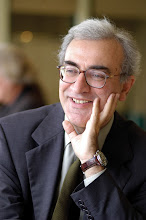Friedrich von Hayek, the Austrian émigré and University of Chicago professor whose 1944 Road to Serfdom dared to suggest that state planning would produce not "freedom and prosperity" but "bondage and misery," visited Pinochet's Chile a number of times. He was so impressed that he held a meeting of his famed Société Mont Pélérin there. He even recommended Chile to Thatcher as a model to complete her free-market revolution. The Prime Minister, at the nadir of Chile's 1982 financial collapse, agreed that Chile represented a "remarkable success" but believed that Britain's "democratic institutions and the need for a high degree of consent" make "some of the measures" taken by Pinochet "quite unacceptable."
Like Friedman, Hayek glimpsed in Pinochet the avatar of true freedom, who would rule as a dictator only for a "transitional period," only as long as needed to reverse decades of state regulation. "My personal preference," he told a Chilean interviewer, "leans toward a liberal dictatorship rather than toward a democratic government devoid of liberalism." In a letter to the London Times he defended the junta, reporting that he had "not been able to find a single person even in much maligned Chile who did not agree that personal freedom was much greater under Pinochet than it had been under Allende." Of course, the thousands executed and tens of thousands tortured by Pinochet's regime weren't talking.
(Continua)




Sem comentários:
Enviar um comentário